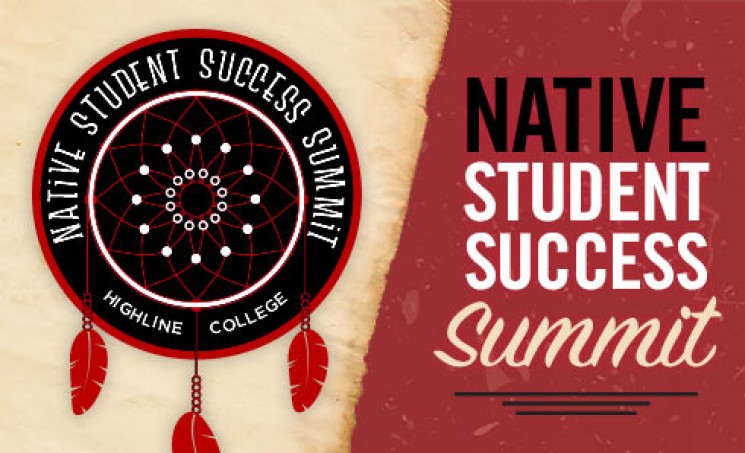Free and Open to All
Wednesday, May 18, 2016
8:30 a.m.–1:30 p.m.
Highline’s main campus, Building 8
Theme: Indigenized Minds and Pathways
The Native Student Success Summit is designed to inspire and empower high school students,* but welcome for all to attend. Registration is required.
During the free summit, participants will do the following:
- Decide on goals and make pledges for their success in ways that respect their culture.
- Connect and create community with other Native students and mentors in south King County.
- Leave with tools and resources supporting Native student success and leadership development.
See below for the full agenda or download a pdf version of the program.
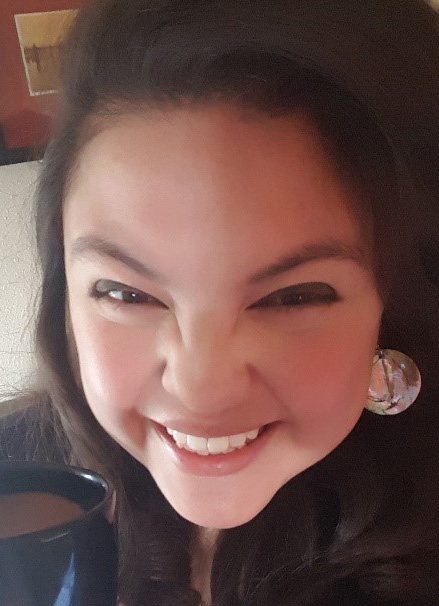
Sara Marie Ortiz
The summit for American Indian and Alaska Native students is the result of a partnership between Highline Public Schools and Highline College, with educators from across south King County contributing their time and talent to its success. Sara Marie Ortiz and Tanya Powers have spearheaded the effort.
Ortiz is a member of Pueblo of Acoma, a tribe in New Mexico, and manages Highline Public Schools’ Native Education Program.
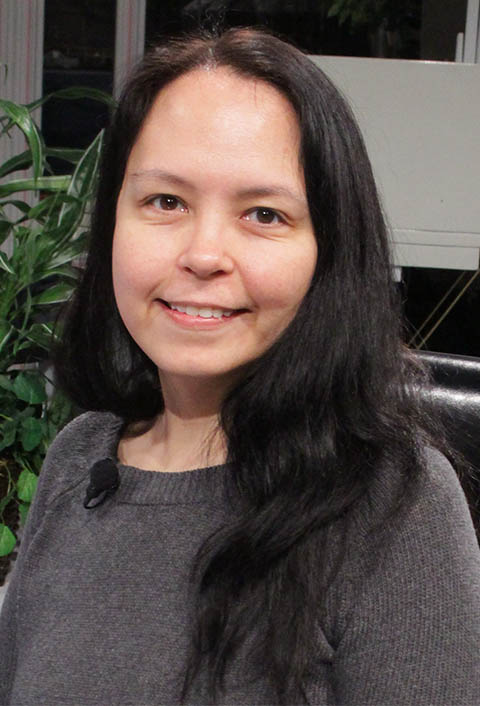
Tanya Powers
Powers is mixed heritage St. Lawrence Island/Siberian Yupik and Irish and is the director of Workforce and Baccalaureate Education at Highline College.
“Last summer, Sara and I brainstormed ways to create community for our youth while honoring their identity and exposing them to college options,” said Powers. “This is what we hope is the first of many such summits.”
According to Powers, the two were inspired by other successful Highline College events for students of color, such as the Black and Brown Male Summit, the Y.E.L.L. Female Summit and the Latino Summit. Approximately 100 students are expected to attend.
Questions?
Tanya Powers: tpowers@highline.edu or (206) 592-3662
Sara Ortiz: sara.ortiz@highlineschools.org or (206) 631-3162
*For high school students, lunch will be provided and local transportation assistance is available. Call for details. High school student should download and have a parent sign the photo release form and bring it to the summit.
Registration
Registration is now closed for the 2016 Summit
Agenda
8:30-8:50 a.m.
Registration
Building 7
8:50-9:05 a.m.
Welcome and Icebreaker
Building 7
9:05-9:45 a.m.
Keynote Speaker: Gyasi Ross
Building 7
9:45-9:55 a.m.
Break
9:55-10:55 a.m.
Breakout Sessions
Session A: Native Identity
Speakers: Crystal Florez and Tommy Segundo
Building 8, Mt. Skokomish room
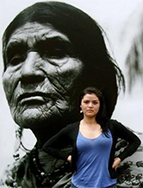 Crystal Florez (White Earth Ojibwe and Chicana) earned her bachelor’s degree from the University of Washington, where she majored in American Indian Studies. Currently, she is a 2016 candidate in the Master of Public Administration graduate program, with an emphasis in Tribal Governance, at the Evergreen State College. She hopes to serve as a change agent for her community, and those alike, by committing to the efforts of Highline Public School’s Native Education Program, as well as local and national urban Indian support organizations, in promoting the vitality of urban Native students, families and communities.
Crystal Florez (White Earth Ojibwe and Chicana) earned her bachelor’s degree from the University of Washington, where she majored in American Indian Studies. Currently, she is a 2016 candidate in the Master of Public Administration graduate program, with an emphasis in Tribal Governance, at the Evergreen State College. She hopes to serve as a change agent for her community, and those alike, by committing to the efforts of Highline Public School’s Native Education Program, as well as local and national urban Indian support organizations, in promoting the vitality of urban Native students, families and communities.
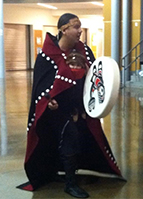 Tommy Segundo was born and raised in South Seattle. He comes from the Haida Nation of Southeast Alaska on his mother’s side and Katzie First Nation/Filipino on his father’s side. He considers himself very much an “Urban Native.” His Haida name is Glaadaay (Big Man Inside). He earned his bachelor’s degree from the University of Washington, is a published author, and has dedicated his professional career to working with Native youth for more than 10 years. He currently works as the Native Education Program Liaison for the Renton School District and works at the high school in which he graduated from.
Tommy Segundo was born and raised in South Seattle. He comes from the Haida Nation of Southeast Alaska on his mother’s side and Katzie First Nation/Filipino on his father’s side. He considers himself very much an “Urban Native.” His Haida name is Glaadaay (Big Man Inside). He earned his bachelor’s degree from the University of Washington, is a published author, and has dedicated his professional career to working with Native youth for more than 10 years. He currently works as the Native Education Program Liaison for the Renton School District and works at the high school in which he graduated from.
Session B: Community Building, Social Justice and Leadership
Speakers: Nahaan Fastsfromenglish, Sara Marie Ortiz and Matt Remle
Building 7
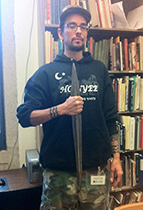 Nahaan áyá x̲át
Nahaan áyá x̲átDak̲ł’aweidí naax̲ x̲at sítee
Kéet Gooshí hít áyá haa naakahídi
Tłákw.aan K̲waan dax̲ áyá x̲at
Paiute k̲á Deikeenaa yádix̲ x̲at sítee
X̲’atas’aak̲ dachx̲án áyá x̲at
I am Nahaan
I am People of the Upper Sand Bar
Our clan house is Killerwhale Dorsal Fin house
I am from the Eternal village
My father’s people are the Paiute and the Kaigani Haida
My grandfather is Inupiaq
Our moiety is the Wolf/Eagle, Killerwhale, Octopus, Seal, Glacier, Iceberg, Flicker, Shark, Moth
 Sara Marie Ortiz (Pueblo of Acoma) is a graduate of the Institute of American Indian Arts and Antioch University Los Angeles’ MFA program with a focus in creative nonfiction. She’s formally studied law, Indigenous education, global self-determination in Indigenous communities, radio, theater, critical theory and film. Ortiz has worked in the realm of Native arts, education, and culture advocacy from her first days as a student at the Institute of American Indian Arts to present day, presenting widely at tribal schools, tribal colleges, conferences, universities, cultural centers and community hubs from New Mexico to Johannesburg, South Africa. She currently manages the Highline Public Schools’ Native Education Program.
Sara Marie Ortiz (Pueblo of Acoma) is a graduate of the Institute of American Indian Arts and Antioch University Los Angeles’ MFA program with a focus in creative nonfiction. She’s formally studied law, Indigenous education, global self-determination in Indigenous communities, radio, theater, critical theory and film. Ortiz has worked in the realm of Native arts, education, and culture advocacy from her first days as a student at the Institute of American Indian Arts to present day, presenting widely at tribal schools, tribal colleges, conferences, universities, cultural centers and community hubs from New Mexico to Johannesburg, South Africa. She currently manages the Highline Public Schools’ Native Education Program.
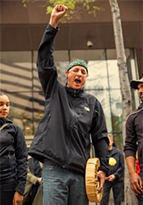 Matt Remle (Hunkpapa Lakota) lives in Seattle. He works for the Office of Indian Education in the Marysville School District. He is a writer and editor for Last Real Indians and runs an online Lakota language program. He is a father of three and the author of Seattle’s Indigenous Peoples’ Day resolution and the Seattle City Council resolution to call on Congress to enter into reconciliation with Tribes over the legacy of the Boarding School era. He has been organizing around issues of environmental, social and tribal justice for more than 20 years. In 2014, he was awarded Seattle’s Individual Human Rights Leader award.
Matt Remle (Hunkpapa Lakota) lives in Seattle. He works for the Office of Indian Education in the Marysville School District. He is a writer and editor for Last Real Indians and runs an online Lakota language program. He is a father of three and the author of Seattle’s Indigenous Peoples’ Day resolution and the Seattle City Council resolution to call on Congress to enter into reconciliation with Tribes over the legacy of the Boarding School era. He has been organizing around issues of environmental, social and tribal justice for more than 20 years. In 2014, he was awarded Seattle’s Individual Human Rights Leader award.
Session C: Career and College: What Should I Do?
Speakers: Trevor Greene, Riel LaPlant, Jim LaRoche and Tanya Powers
Building 8, Mt. Constance room
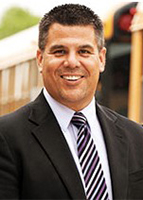 Trevor Greene taught Spanish and English for a dozen years at the middle school, junior high, and high school levels, followed by three years in administration, before becoming the principal at Toppenish High School on the Yakama Indian Reservation in Toppenish, Wash. During his tenure at THS, the school (94 percent minority, 100 percent poverty) achieved a 94 percent graduation rate and became the most decorated high school in Washington state, named a STEM Lighthouse School by the Office of Superintendent of Public Instruction, twice honored as a state Golden Apple recipient, and presented with five Washington Achievement Awards.
Trevor Greene taught Spanish and English for a dozen years at the middle school, junior high, and high school levels, followed by three years in administration, before becoming the principal at Toppenish High School on the Yakama Indian Reservation in Toppenish, Wash. During his tenure at THS, the school (94 percent minority, 100 percent poverty) achieved a 94 percent graduation rate and became the most decorated high school in Washington state, named a STEM Lighthouse School by the Office of Superintendent of Public Instruction, twice honored as a state Golden Apple recipient, and presented with five Washington Achievement Awards.
Greene was selected as the 2012 Washington State High School Principal of the Year and, in 2013, received National Principal of the Year honors from the National Association of Secondary School Principals (NASSP). Greene then fulfilled a one-year fellowship as a Principal Professional Development Specialist by the Association of Washington School Principals (in conjunction with the Bill & Melinda Gates Foundation), where he worked to support K–12 principals statewide.
In the year prior to his current position in the Highline School District, Trevor served as Executive Director of Instructional Leadership. In one year, all principals with whom he worked increased the graduation rate in their schools—two by more than 17 percent. Currently, he is the Executive Director of Human Resources (Workforce Planning) in a district supporting five municipalities where more than 100 languages are spoken. In addition to his school district work, he provides one-on-one executive coaching in The Breakthrough Coach Management Methodology for administrators nationwide.
Greene earned his bachelor’s degree from Brigham Young University, his master’s degree and principal certification from Central Washington University, and his superintendent’s credential from Washington State University.
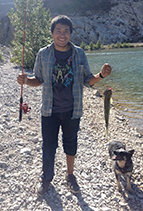 Riel LaPlant (Blackfeet) grew up on the Blackfeet Indian Reservation. In 2009, he was accepted into Stanford University and graduated in 2014 as a human biology major. He gravitated to Global Connection High School to work as an AmeriCorps success coach for Highline School District’s GEAR UP program. Some of his interests include fantasy and science-fiction literature, fishing, running, anime and the betterment of Native American youth.
Riel LaPlant (Blackfeet) grew up on the Blackfeet Indian Reservation. In 2009, he was accepted into Stanford University and graduated in 2014 as a human biology major. He gravitated to Global Connection High School to work as an AmeriCorps success coach for Highline School District’s GEAR UP program. Some of his interests include fantasy and science-fiction literature, fishing, running, anime and the betterment of Native American youth.
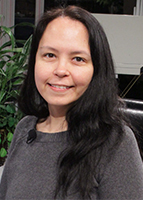 Tanya Powers is mixed heritage St. Lawrence Island/Siberian Yupik and Irish. A first-generation college student, she earned her associate degree at Seattle Central College and her bachelor’s degree and Master of Public Administration at Seattle University. Powers has spent most of her career in higher education with a focus on working with low-income students, first at Seattle Central College and now at Highline College. She is interested in access and retention for under-represented students in higher education. She is also the mother of two strong daughters. Kelsey is a freshman at Georgetown University, and Morgayne is a freshman in high school with a passion for junior roller derby.
Tanya Powers is mixed heritage St. Lawrence Island/Siberian Yupik and Irish. A first-generation college student, she earned her associate degree at Seattle Central College and her bachelor’s degree and Master of Public Administration at Seattle University. Powers has spent most of her career in higher education with a focus on working with low-income students, first at Seattle Central College and now at Highline College. She is interested in access and retention for under-represented students in higher education. She is also the mother of two strong daughters. Kelsey is a freshman at Georgetown University, and Morgayne is a freshman in high school with a passion for junior roller derby.
Session D: Decolonizing Gender
Speakers: Joshua Magallanes, Raven Ezekiel Heavy Runner
Building 14, room 102
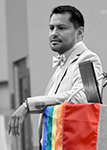 Joshua Magallanes has a critical analysis about adolescent development for queer individuals happening later in life. He believes that the same process that one experiences when coming of age as an adolescent, applies when they identify as LGBTQIA*, regardless of age. During this time, individuals tend to struggle and experience their first internal conflicts a second time. Magallanes refers to this time in life as “gay adolescence,” as when one is experimenting while trying to find community. We are creative and tactical: we are forced to lead double lives while at the same time feeding just enough of ourselves in order to survive. He also believes that it’s these exact social constructions that shape our everyday views and influence how we view what it means to be a man, or masculine.
Joshua Magallanes has a critical analysis about adolescent development for queer individuals happening later in life. He believes that the same process that one experiences when coming of age as an adolescent, applies when they identify as LGBTQIA*, regardless of age. During this time, individuals tend to struggle and experience their first internal conflicts a second time. Magallanes refers to this time in life as “gay adolescence,” as when one is experimenting while trying to find community. We are creative and tactical: we are forced to lead double lives while at the same time feeding just enough of ourselves in order to survive. He also believes that it’s these exact social constructions that shape our everyday views and influence how we view what it means to be a man, or masculine.
After earning his bachelor’s degree from Northern Arizona University, Magallanes moved to Seattle in February 2004 and began working at Highline that fall where he is currently a faculty member teaching in both the Human Services and Diversity and Globalism Studies departments. His classes include “The LGBTQI Experience.”
Magallanes earned his master’s degree in community counseling from Seattle University. He has worked in higher education for the past 13 years for both universities and colleges. Through his work, Magallanes explores the societal expectations placed on communities of color and queer communities across the region, state and nation as a way to continue to raise awareness and create change through facilitated workshops and presentations.
Magallanes has spoken and led workshops at the Students of Color conference, annual American Counseling Association conference and Black and Brown Male Summit, and has also sat on boards for scholarship selections. Joshua is the committee chair for the LGBTQIA Task Force at Highline College and served on the board of directors for Gay City Men’s Health Project.
Additionally, he provides therapy in his private practice for individuals, couples and families and facilitates process groups. His special interest areas for therapy are working with students who have depression or anxiety, sexual identity/orientation, oppression awareness and career/life exploration. He has also worked as a consultant for Edmonds School District, where he provided professional development for K–12 staff and administrators.
Magallanes believes the developmental process is never a road that is paved or less traveled; the way we travel it and experience it are what makes us marvel at the amazing products along the way.
In his free time, Magallanes enjoys playing and coaching softball, traveling to new places, enjoys white water rafting, camping and fishing under the liquid sunshine, and spending time with family and friends.
*LGBTQIA = lesbian, gay, bisexual, transgender, questioning or queer, intersex, ally (a friend of the cause) or asexual
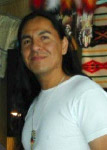 Raven Heavy Runner is an enrolled member of the Blackfeet Tribe of Montana. He was raised both on the Blackfeet Reservation and Seattle Washington. He came from a large family of 9 children and at age 6 attended a Bureau of Indian Affairs boarding school in Montana. At age 14, he ran away to Seattle and became a street kid. After getting help from a couple Native American agencies serving the Seattle area he was able to obtain a GED.
Raven Heavy Runner is an enrolled member of the Blackfeet Tribe of Montana. He was raised both on the Blackfeet Reservation and Seattle Washington. He came from a large family of 9 children and at age 6 attended a Bureau of Indian Affairs boarding school in Montana. At age 14, he ran away to Seattle and became a street kid. After getting help from a couple Native American agencies serving the Seattle area he was able to obtain a GED.
As a young adult he entered the U.S. Army and after 3 years he returned to civilian life and started college. Over the next two decades his path brought him to LGBT activism, theater, Two-Spirit leadership, while attaining his bachelors and eventually his Masters in Social Work. Although his main vocation was Indian Child Welfare, he also continued serving the community in volunteer positions advocating for Two-Spirit issues. Raven has chaired of the Northwest Two-Spirit Society for the last 15 years.
He is a board member of the Montana Two-Spirit Society and the Northwest Two-Spirit Society’s delegate to the International Council of Two-Spirit Societies. He sits on several other Native boards and currently works as a social worker with Native Elders in Western Washington.
10:55-11:25 a.m.
Lunch
Building 8, Mt. Constance room
11:25-11:40 a.m.
Physical Movement/Icebreaker: Health and Wellness
Facilitators: Maxine Alex and Crystal Florez
Building 8, Mt. Constance room
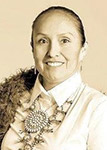
Maxine Alex is from the Diné Nation and received her B.A. In Sociology with emphasis on Social Psychology from Stanford Univeristy. She is the Native Education Coordinator for Federal Way Public Schools. She likes building tendrils and dendrites. She believes in the power of our youth and the wisdom of our elders. Native wellness is not an option if we are to lift up our People! She has Indigenous knowledge and is not afraid to use it. She loves to laugh, dance, run, workout, sew, bead, attend powwows, etc.
11:40 a.m.-12:20 p.m.
College Student Panel with Q&A
Building 7
12:20-1:10 p.m.
Dreamcatcher Activity: Identify Goals and Create Pledge
Facilitator: Robin Pratt
Building 8, Mt. Constance room
1:10-1:30 p.m.
Validation and Closing
Speaker: Tommy Segundo
Building 8, Mt. Constance room
Keynote Speaker: Gyasi Ross
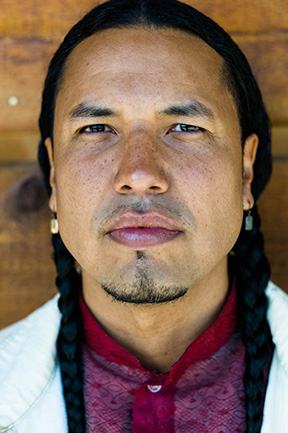 Gyasi Ross (Blackfeet) is an essayist and writer, poet and speaker, lawyer and activist. Through a life of service, listening and living within Native communities, Ross profoundly understands the needs of his people and has dedicated his life to forging change within his communities.
Gyasi Ross (Blackfeet) is an essayist and writer, poet and speaker, lawyer and activist. Through a life of service, listening and living within Native communities, Ross profoundly understands the needs of his people and has dedicated his life to forging change within his communities.
Part of Ross’ mission is raising the profile of the reservation populace, often viewed with ignorance as a shadowy world, as well as instilling a sense of pride among the people.
He has taken his message to hundreds of colleges and universities, high schools and community venues nationwide. He has become a voice on racism and social justice and has been a keynote speaker at national conferences on racial equity, social justice and white privilege.
“My point in everything is helping my community and the various populations therein to influence the systems that affect them. My goal in life is about mentorship, about figuring out how to instruct others to fulfill their purpose and understand the sense of self-awareness and application of spirituality to everyday life. To understand that we are worthwhile: economically, politically, educationally, and spiritually. We have a lot to offer.”
Ross is the author of two books, “Don’t Know Much About Indians (But I Wrote This Book About Us Anyway)” (2011) and “How to Say I Love You in Indian” (2013).
“I come from a family of storytellers. My family tells long stories, drinking coffee and blowing smoke in your face. It just fit for me to tell stories, and then I started writing them. My standard for writing stories is, if I can’t explain it to my niece or nephew, or my grandpa who dropped out of school then I need to understand this topic better. People have a love affair with over-academicizing things.”
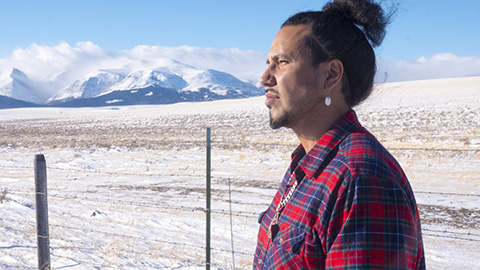 Ross has taken his poetry into the hip-hop realm by releasing a spoken word/hip-hop album in 2015 titled “Isskootsik” (Before Here was Here).
Ross has taken his poetry into the hip-hop realm by releasing a spoken word/hip-hop album in 2015 titled “Isskootsik” (Before Here was Here).
Ross has written for the Huffington Post, Indian Country Today, Deadspin and Gawker and is often tapped to appear on various talk shows and news programs (including MSNBC and ESPN) on topics about Indian Country and beyond (immigration, climate change, sports). Despite early educational struggles (attending six colleges, including two tribal colleges, before graduating from Columbia Law School), Ross continues in the family business of working within the community and telling his people’s stories.
Always believing in his mission, Ross first and foremost just wants things to be right with the complex world of the Indian nations.
“Gratification is internal and I’m comfortable with that,” Ross says, “I’m just trying to figure out how to help my folks.”
Thank you to Gyasi Ross for sharing his biography.

